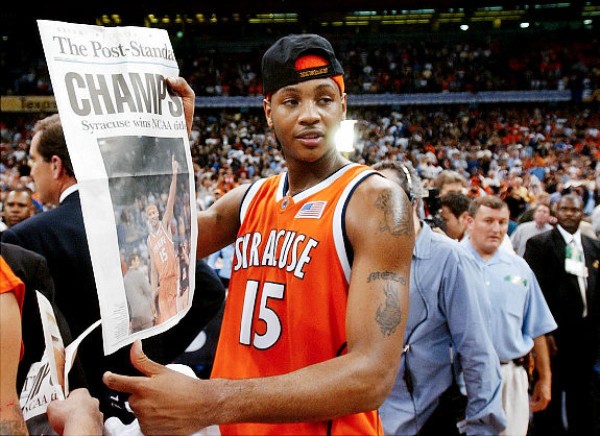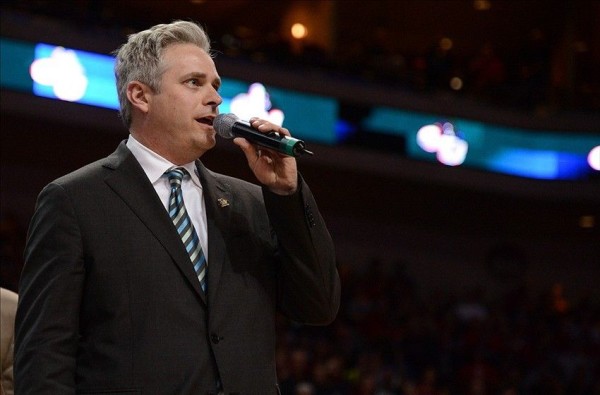Media Timeout: Could College Basketball Survive a Longer NFL Season?
Posted by Will Tucker on March 2nd, 2016College basketball places huge emphasis on individual games — showdowns between top-ranked teams, annual rivalry clashes, single-elimination tournaments — but it’s important to take a step back and look at the bigger picture from time to time. The Media Timeout considers how fans and journalists watch, follow, and talk about the sport.
Rejoice, for it is March. If you’re a college hoops-first sports fan like me, then welcome to our favorite part of the calendar. With football in the rear-view there are no distractions as the nation turns its collective attention toward March Madness. But after the confetti is all swept away and the last bars of “One Shining Moment” fade out, we’re left to confront an uncomfortable question: Is college basketball still relevant?
Questions about college basketball’s viability in an increasingly football-dominated American sports landscape seem to induce more hand-wringing each season. The growing popularity of the NCAA Tournament should reassure college hoops fans that the sport won’t lose its signature month of attention anytime soon, but the prominence of March also has the unintended consequence of making the regular season increasingly trivial. With the threat of an 18-week or 18-game NFL season still looming, is it unreasonable to consider a future in which college basketball becomes an afterthought until the final weeks before Selection Sunday?
Suffering the “Super Bowl Creep”
In February 2011, the day after the Packers won Super Bowl XLV, The Olympian columnist John McGrath issued a challenge to his readers: “Pop quiz: Identify a significant college basketball game played before the Super Bowl. I don’t mean just this year. I mean, over the past 45 years.” The question isn’t entirely rhetorical – he goes on to recount the Virginia-Georgetown matchup that pitted Ralph Sampson against Patrick Ewing in 1982 – but his point is that college basketball games of great consequence are few and far between before mid-February. Outside of Kentucky, I suspect basketball fans would agree that the most memorable – and meaningful – games tend to come later, only after college football and the NFL loosens its stranglehold on the American sports scene. But college hoops used to benefit from many more opportunities to leave an impression. McGrath cites huge games that came within a week of mid-January Super Bowls in 1968 and 1974, back in the days before a February Super Bowl became the norm.
So what happens if a revamped NFL schedule pushes the Super Bowl back even further? Reports surfaced last fall that the league’s brass were calcu lating the revenue benefits of trimming the lackluster preseason slate in order to either extend the regular season or expand the playoffs. The possibility seems more real now than ever, as both sides of the NFL labor divide have expressed a willingness to try to make it work (although the 14-team playoff proposal appears to “remain in the exploratory stage”). Commenting on a season ticket price hike announced by the Bears this month, a Chicago Tribune columnist speculated that the move could portend the coming 18-game season and a February 28 Super Bowl.

The Super Bowl last fell in January in 2003, when Carmelo Anthony lifted Syracuse to their first national title. (Schneider/KRT)
Is March the proper measuring stick?
In responding to the question of relevancy, fans and writers often tout the record-setting viewership of the NCAA Tournament in recent years. Last year’s tournament made headlines for scoring the highest overnight ratings since 1993, while the Wisconsin-Duke matchup at its conclusion was the most-watched title game since 1997. 2015 was only the latest in a recent series of blockbuster NCAA Tournaments, and next month’s edition seems poised to perform just as well, given the likelihood of total chaos and a Cinderella champion.
But it’s nearsighted to focus on the Tournament’s gaudy numbers without considering the growing viewership disparity between March and the rest of the season. During the regular season, when viewership is more fragmented across networks and among different pockets of fans, only a couple dozen games even move the ratings needle. Regular season broadcasts average under a half-million viewers – an order of magnitude fewer than an average NCAA Tournament broadcast. High-level administrators acknowledge that this poses a critical problem for the sport: Pac-12 Deputy Commissioner Jamie Zaninovich last season floated the idea of truncating the season to a single semester to “help the sport escape the shadow of both college football and the NFL.” In a piece for Time lamenting the soullessness of college hoops in the big revenue-driven era, Sean Gregory went a step further, making a forceful argument that the sport was “at risk of becoming a one-month sport.”

Pac-12 Deputy Commissioner Jamie Zaninovich wants to make college hoops a one-semester sport (Pac-12)
Networks make for poor advocates
With those ideas in mind, what’s the long-term outlook for college basketball? It’s hard to predict the whims and caprices of the American viewing audience – it’s hard to even say whether those preferences are self-determined or dictated by trends in coverage. Major television networks are seasoned in the art of force-feeding their audiences, and you could argue that a sport is relevant only as long as it’s saturating television screens. For that reason, it’s been disconcerting to see ESPN’s treatment of college hoops lately. While there’s zero empirical evidence to validate it, I know I’m not the only one who’s noticed the network’s shifting stance towards ambivalence. Maybe it’s something behind-the-scenes to which I’m oblivious – a new strategic plan that calls for pivoting emphasis from certain aspects of the sport to others – but it feels like the network is grappling with how to best package the sport, and that confusion is manifesting in contrived, awkward coverage.
Those impressions were more or less confirmed by the recent controversy over ESPN’s introduction of its “Green Room Guys” segment, in which the broadcast checks in on the performances of projected NBA lottery picks playing around the country on a given evening. The stunt backfired miserably, eliciting a blistering indictment from Roy Williams on ESPN’s tendency to portray college basketball as little more than a temporary caretaker and conduit for superstars on their way to the NBA. His assessment was widely supported by national writers like Seth Davis, who wrote, “the time devoted to draft speculation is well out of proportion with the interest that college basketball fans have in the subject.” Regardless of whether college basketball is culturally viable, the way it’s being portrayed by the Worldwide Leader and its broadcasters isn’t doing the sport any favors – certainly not by reinforcing the narrative that it’s about only the NCAA Tournament and NBA prospects. Further encroachment by the NFL schedule would threaten to severely exacerbate that problem, potentially redefining college basketball as a month-long Super Bowl comedown rather than a half-year marathon. The best defense against that scenario is a proactive one. Right now, it’s up to the coaches, administrators, and broadcasters to determine which form gives college basketball the best chance of long-term survival.












































CBS has already subordinated college basketball to another sport, golf. Any expansion of the NCAA tournament (or a later start of the season) is forbidden because it would interfere with that crown jewel of CBS Sports, the Masters.
A later start for the NFL might force the NCAA to move the start for men’s basketball back a month more.
Really good point, Tom. The ongoing football/basketball tussle isn’t a zero-sum game as there are other — very lucrative — moving parts in the broadcasting equation.